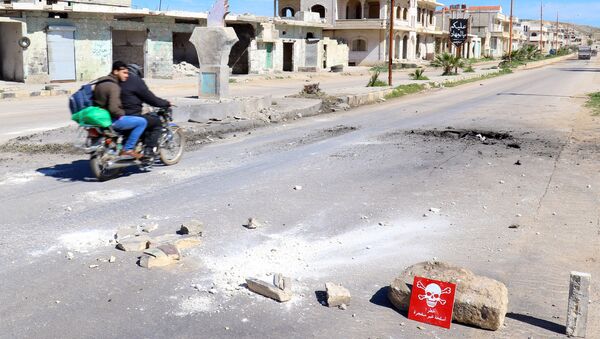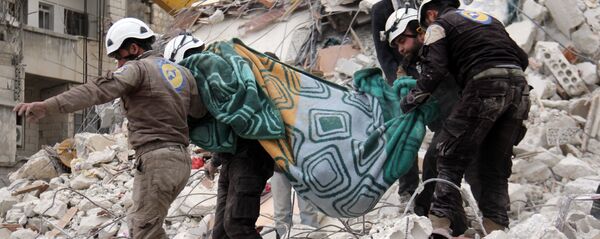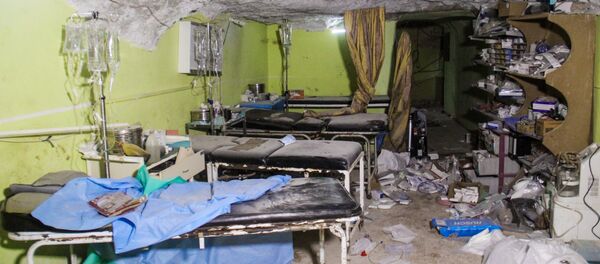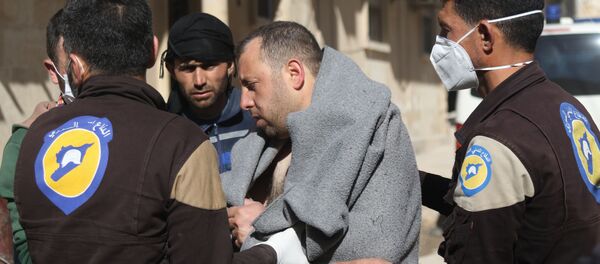The Syrian National Coalition of Revolutionary and Opposition Forces as well as a number of Western states accused the Syrian government troops of carrying out the attack, while Damascus has refuted these allegations, saying it did not possess chemical weapons.
Paris launched a probe into the matter, which echoed the US assertion that Damascus was to blame for the suspected attack. The inquiry claimed that the sarin allegedly used in Idlib province on April 4 bears a resemblance to the nerve gas produced in Syria before 2013.
Speaking to Sputnik France, Brigadier General Dominique Trinquand, a former crisis employee of the UN, NATO and the EU, underscored the French government's biased approach to the investigation.

"I know how the situation developed in Bosnia and Herzegovina as well as in in 2003, when there were all these manipulations with Iraq. [As for the current situation], the problem is that there was no investigation because it turned out that the French government had taken all the materials in order to conduct the probe on its own. It would be better if an international investigation would have been launched, but we know why that didn't happen," he said.
Political analyst Jacques Hogard, for his part, pointed to the drive of French politicians to topple Syrian President Bashar Assad.
According to him, although "we know that sarin was used in Syria's Khan Shaykhun, we also know that it was not in the interest of Bashar Assad to use this type of weapon at a time when he was on the road to victory thanks to Russia."
"So who could benefit from this crime? Definitely not President Bashar Assad. One can never rule out a mistake, but now that we see a drive to prevent Assad from dealing with a peaceful settlement in Syria, it becomes clear that we are probably witnessing manipulation," Hogard added, referring to the French probe.
Patrick Barriot, former military doctor and colonel of the French army, in turn, questioned the independent nature of the investigation.
"Every time, the case is investigated by experts whose independence is questionable. Have you seen how fast everything was done? The attack in Khan Shaykhun occurred on April 4, and the report was published on April 26, with the Americans staging a missile attack almost shortly after [the original attack]. Incredible speed! It is impossible to properly and honestly conduct an investigation in such a short period of time," he said.
Barriot added that as for the isopropanol and methylphosphonyl dichloride mentioned in the probe, they "are available to everyone in the region, chemical substances that are used to make fertilizers, for example."
"There is nothing complicated in this, it proves nothing, even if they found the same components [on the site of the alleged attack]. On the other hand, they could have been brought from Turkey," he said.
Meanwhile, an Iranian diplomat who spoke to RIA Novosti upon condition of anonymity said that the Idlib incident could have been a joint operation by the Jabhat Fateh al-Sham, also known as the al-Nusra Front, and Turkey. In this context, the alleged use of Syrian-made sarin does not necessarily prove the involvement of Damascus in the attack.
"In Iran, the chemical attack in Syria is regarded as a joint provocation by Turkey and the al-Nusra Front," the source stressed.
On Monday, Russian Foreign Minister Sergey Lavrov called this decision strange as the Russian-Iranian initiative did not stipulate anything other than conducting "an independent, impartial, transparent investigation" with experts visiting the site.
Never miss a story again — sign up to our Telegram channel and we'll keep you up to speed!







